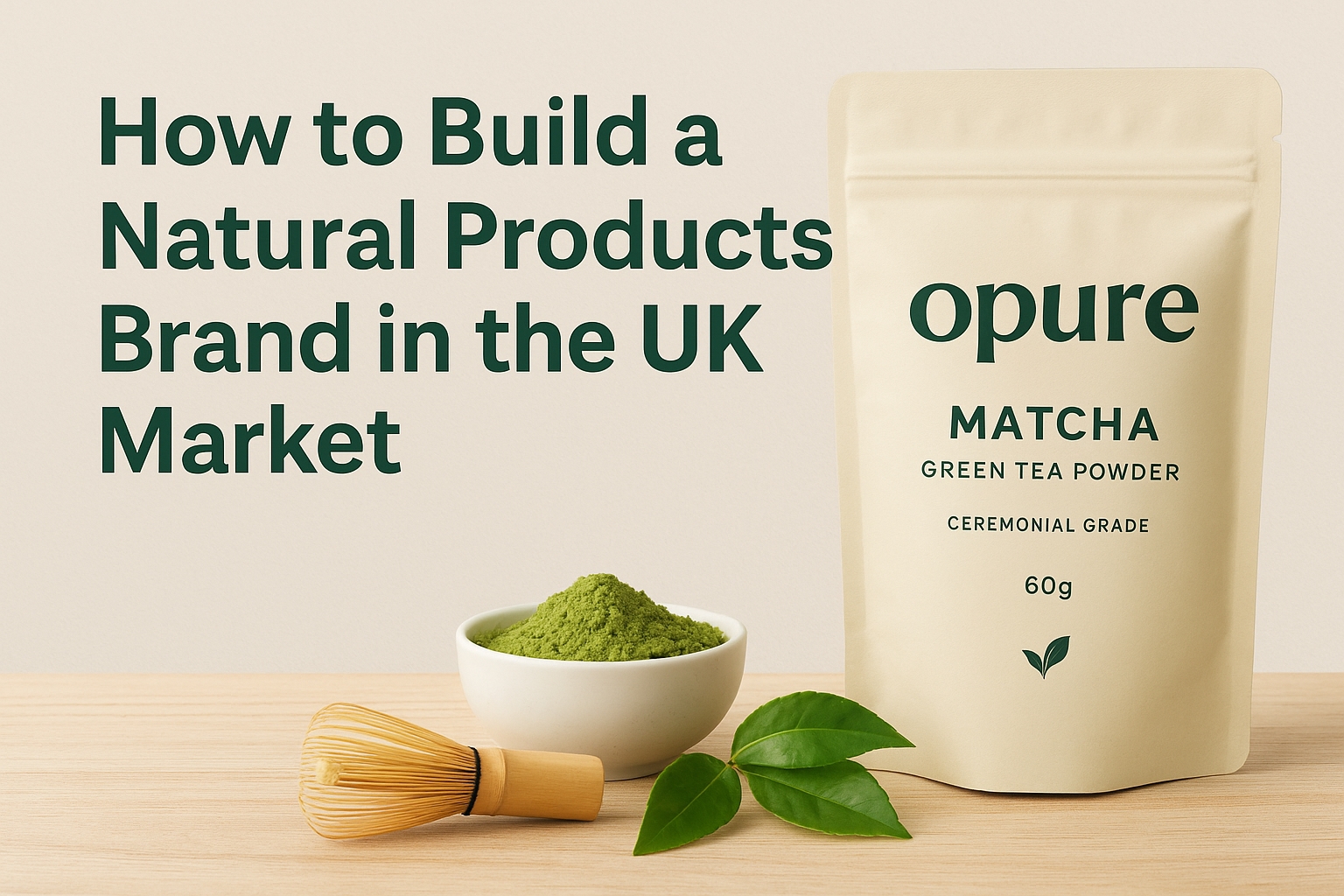
The UK market for natural and organic products is expanding rapidly: the UK organic food & drink market grew 7.3% in 2024 to reach around £3.7 billion, showing strong consumer appetite for certified, clean-label goods. That growth creates opportunity — but also competition. To win, brands must combine product integrity, regulatory compliance, supply-chain transparency, and clear storytelling. Soil Association
1. Start with a product customers actually want — validated by research
Begin with rigorous category research, not assumptions. Use a mix of:
Quantitative validation: small paid ads, pre-orders, or landing-page signups to measure demand.
Qualitative feedback: in-person tastings, focus groups, and interviews with target shoppers (e.g., health-conscious professionals, eco-minded parents).
Competitive gap analysis: what are incumbent brands missing — in ingredients, format (sachets vs jars), or price?
For a brand like Opure, which focuses on matcha and wellness powders, consider testing product variants (ceremonial vs culinary matcha, blended wellness powders with UK-grown botanicals) and track conversion metrics to choose the strongest SKU to launch.
2. Formulation, safety & legally compliant labelling (non-negotiable)
Natural products often sit in a regulatory grey area between foods and supplements. In the UK, food supplements and foods have specific compositional and labelling rules — and regulators expect accurate claims and traceability. Work with a qualified food scientist or regulatory consultant early to ensure your ingredient lists, nutritional panels, allergen labelling, and health claims comply with UK law. Seek guidance from the Food Standards Agency and official labelling documents to avoid costly recalls or enforcement. Food Standards Agency+1
Checklist highlights:
Accurate ingredient declaration and correct use of the term “food supplement” where relevant.
Batch records and GMP-style documentation for quality control.
Lab testing (heavy metals, microbiology, pesticide residues) where applicable.
3. Build an ethical, survivable supply chain (local + global balance)
Consumers reward traceability. Wherever possible, source organic or regenerative ingredients with auditable provenance. For ingredients that must be imported (e.g., ceremonial-grade matcha), be transparent about origin and quality; for UK-sourced botanicals and packaging, highlight the local partnerships.
Practical steps:
Sign supplier agreements and conduct periodic audits.
Blend local sourcing with essential imports to tell a credible provenance story.
Plan for regulatory and logistics risks (customs, shipping delays) to improve resilience.
Sourcing strategy matters commercially too: UK brands must prepare for cost and regulatory shifts in packaging and waste — Extended Producer Responsibility (EPR) now places new obligations on producers for packaging recycling costs, so plan packaging choices and reporting accordingly. GOV.UK+1
4. Packaging that protects product quality and aligns with sustainability
Packaging needs to balance three things: product protection (light/air/moisture for teas and powders), regulatory labelling, and sustainability credentials. Consider:
Barrier pouches with resealable zips for powders plus exterior recyclable cardboard sleeves.
Clear recycling instructions and on-pack provenance info to build trust.
A lifecycle assessment or impact statement for press and SEO content.
Be aware that UK policy changes (EPR / packaging taxes) are raising costs for producers and will affect packaging choices and pricing strategies. Financial Times
5. GTM strategy: retail, DTC, subscriptions and trade channels
A blended go-to-market wins in the UK:
Direct-to-consumer (DTC) via Shopify or Magento for margin control and customer data.
Subscription models to increase LTV (use small discounts + easy skip/cancel).
Foodservice & wholesale partnerships (cafés, spas) for sampling and social proof.
Selective retail listings (premium grocers or health stores) to build credibility.
Track acquisition costs by channel, repeat purchase rate, and margin per channel — these metrics determine how aggressively you can scale.
6. Brand positioning, storytelling & E-E-A-T for discoverability
Google rewards authoritative, experience-driven content. Build a content plan that demonstrates expertise and first-hand experience:
Long-form guides (sourcing, brewing matcha, ingredient benefits).
Farmer profiles and sourcing pages to prove provenance.
Lab tests or certificate snapshots to show verifiable claims.
For SEO, target a mix of commercial intent keywords (“organic matcha UK”, “buy ceremonial matcha”) and informational queries (“how to make matcha latte”, “benefits of organic green tea”). Use structured data for product pages and publish author bylines to support E-E-A-T signals.
7. Funding, growth and investor readiness
Early-stage natural brands often use founder capital and angel rounds. UK schemes such as SEIS/EIS can help attract investors by offering tax reliefs — consider advance assurance from HMRC when structuring investor offers. That early financial credibility helps when negotiating with retailers or scaling manufacturing. British Business Bank
8. Measure, iterate, and protect reputation
Key metrics to monitor:
CAC, LTV, repeat purchase rate, churn for subscription.
Product return rate and customer complaints (indicator of quality issues).
PR sentiment and review scores (Trustpilot/Amazon).
Create a playbook for customer service and a crisis response plan for labelling or recall issues.
A roadmap tailored for opure.co.uk
Building a natural products brand in the UK demands product excellence, regulatory attention, supply-chain transparency, and content that proves experience and expertise. For opure.co.uk, the strongest path is to combine authentic global ingredients (for example, high-quality matcha) with UK-based cultivation, packaging, and storytelling that underlines provenance and sustainability. Document each step — from lab testing to farmer partnerships — and publish the evidence. That combination of honesty, quality, and measurable impact is what wins customers and search engines alike. Soil Association+1
